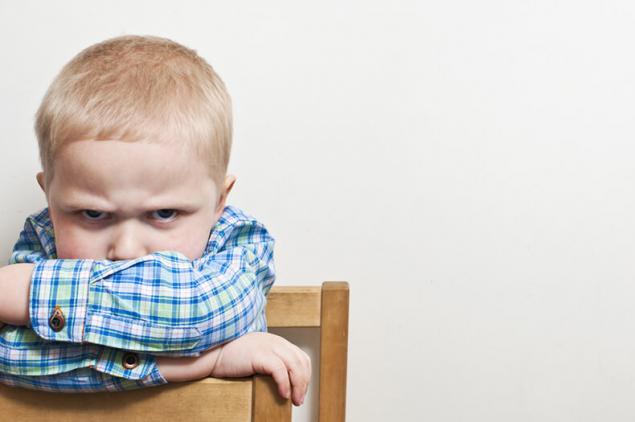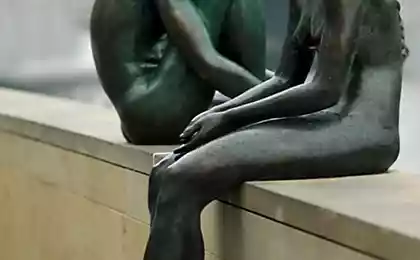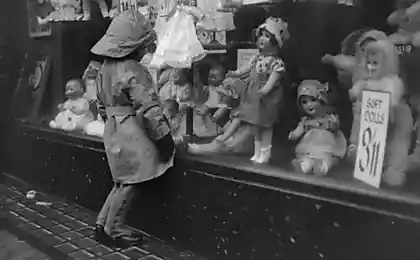667
How to teach a child how to Express anger
The child from early childhood are taught that to be angry is not good, because the person expressing anger may not "fit" into society. As a result, instead of learning to Express his anger appropriately, he gets used to suppress it. And any depressed feeling sooner or later it spills out.
And often people who behave with restraint in society, a home turn into a fire-breathing volcanoes. To avoid this, and to preserve the health of children, you must teach them to properly Express negative emotions and with the least losses to get out of difficult situations. How to do it — tell the teacher-psychologist.

Anger is a strong and mixed feelings. It is believed that to be angry is bad, because it leads to fights, insults, quarrels. However, no wonder there are expressions of "righteous anger", "anger". Such experiences are often needed to cope with a difficult task or defend their opinions. For example: the woman with calm character, could not complete the trial.
Each time the meeting was postponed, and it was sent for another certificate. She meekly agreed, waste your time, nervous, extracting the desired document, and brought it to the court... and the situation was repeated. It lasted for three months. Gradually, the irritation increased and finally turned into the "righteous anger" that resulted in all of the hearing participants, although perfectly acceptable form. The process ended on the same day, and the decision was made in her favor.
Anger arises in response to the event that the person does not like. Then, changes on the physical level: increases heartbeat, muscles tense, breathing becomes rapid. Small children can shout, fight, throw things. The older children begin to call you names, spitting. Teenagers and adults often hold back and even smile despite the raging emotions inside, and can behave like a little.
Meanwhile it is known that anger can have a positive effect — it mobilizes internal forces of the body. It often helps to overcome himself in a difficult situation, to protect the weak. And the sportsmen in this state, even set records.
Bully and demure
This uneasy feeling is one of the base obtained in the process of evolution. In the animal world, anger is necessary to survive, to cope with the enemy, become the pack leader. However, in the human world there are other laws.
Me for consultation he came to the twins ' parents, Oleg and Nikolai, boys 6 years. The children were very different. Olezhek loved to read books, playing quiet games, listening to mom, avoid active sports, afraid of high ladders, gave his toys to other children, even if not wanted.
Nick, on the contrary, the games were rather noisy and movement, protested in any parent note, fighting with the guys in the group, if something is not liked, he stood up for his brother, was the ringleader in games and on the street are not afraid of anything. Of course, adults bothered by it. Although Olie was angry, no less — but he used to hold back and in 6 years suffered from headaches.
Help needed both. And to both was incomprehensible the causes of their anger, they were not able to adequately show her. After the fight, and complete containment of all desires — methods are ineffective. The brothers were not able to verbally Express their experiences.
Sensations in the body tell us from what we actually experienced in a given situation
For starters we figured out what situations cause irritation, and that each of them can say. Not do, and exactly what words to say in the beginning — until the irritation turned to anger. We researched where in the body is "live" different feelings: anger, joy, sadness. Because the sensations in the body tell us from what we actually experienced in a given situation. In role-playing games were played options new behavior.
Parents and caregivers recommendations. In relation to If: if there's a fight, first of all, don't use the usual "ay-Yai-Yai, fighting is bad". React in a new way: to identify a child's sense and offer a different way of expressing it. For example: "I see you're mad. Wanted to say: "don't bother me to play (I don't want to give a toy, etc.)"? Next time just say so".
Recommendations for Oleg: to cease promoting its "too good" behavior. If he gives the toy and on the face — longing, to call his possible feelings and offer them adequate expression, "I see you want to play this game. Do not have to give everything. You can say: "I now want to play myself. Maybe the ladies later.“ And explain that if he is attacked, we need to say loudly and clearly: "Leave me alone! Don't touch me!“.
How to translate anger in a peaceful direction
Usually the adults encourage the children never to be angry or not to Express my emotions. And then whenever the child feels anger (and not experience it, he can not — is a physiological mechanism that is triggered in any situation not meeting people), he thinks something is wrong, he feels ashamed and even more angry. However, depending on temperament, personal characteristics, and style of parenting some people get angry at myself mostly, but some are exclusively for others.
What can parents do to give their son or daughter has learned to understand the causes of their feelings and civilized way to Express anger?
Step one: articulate the child's condition.
This is very important because the child learns to recognize his feelings, provided that parents do call them. Starting from 2-2,5 years naming the child's feelings allows him not to feel bad when it happens that parents don't like. He begins to understand: "If the body feel so-and-so or want to do something a certain means, experiencing anger (sadness, joy, surprise, fear etc.)". And then there is a choice: we can Express the experience in different ways.
If baby is clearly not something angry that it is important to tell him that you see his condition: "I think you're mad at something or someone." Accustomed to blame others most likely pretty quickly describe the colors in which bad people surround him. Child, hiding feelings, maybe just not to admit what happened.
Unfortunately, this often happens because of fear that parents will judge, so you'll have to make an effort to get him to talk. We can say directly, "I'm not here to bust you. Just see that something happened. And want to help.“ You can share memories from his own childhood: "When I was little, I was very upset when..." — here is the situation similar to what happened with the child.
Step two: join the feelings of the child.
Unfortunately, in most cases, we pass this important moment and immediately begin to give advice. Later, however, surprised that our in all respects correct recommendations instead of gratitude we get reproach: "You don't understand me!". The fact is that, only by adhering to the feelings of the child, we help them to get rid of them to calm down and be open to constructive discussion.
Only by adhering to the feelings of the child, we help them to get rid of them, to calm down.
When a child is angry, he often speaks about how he wanted to take revenge. Another variant of behavior — the sincere belief that life has now ended and only one way out — to die. Both indicators of strong emotions. Parents in such situations is to say that they understand the strong emotions of the child. For example: "you Feel that you are so angry that ready to deliver to the offender a lot of trouble." Or: "When you get into a bad situation, but still in sight of everyone, then you really want to sink into the ground once and for all".
Such parent, on the one hand, show the child that they are really ready to listen and help, and with another — to expand his ideas about exactly what hurt and caused anger. Sometimes adults mistakenly believe that children are able to logically sort through what happened to them. But this is only possible in the age of 7-9 years, and then assuming that since 2.5-3 years the child is taught to establish a causal link of events. Because children often do not understand that their angry about. It is therefore important that adult he spent such a logical connection. And preferably not do it at the time of the peak of the fury of the child, and when he calms down.
Let's consider an example. The teacher observes the following situation. Lisa comes to the Masha and offers to play together with the doll. Mary turns away from her to Light. Lisa fit with other parties — Masha turns away again. Lisa blushes, Cams are compressed, and the teacher manages to stop her in the moment when the doll almost fell on the head of Mary.
The actions of the teacher: step one — teacher prinimaet Lisa, and puts aside with the words: "you Seem very angry". In response — silence and heavy breathing. Step two says to the girl: "Yes, it's a shame when you want to play with a friend, and she's not with you". Lisa, incredulously looking from under his brows and sighing, says: "it's such a shame even want to hit her!".
Step two: help the child to Express anger in an adequate way.
If you are constantly holding unspent tension accumulates in certain areas of the body, forming muscle clamps, cramps.
Again, anger is instilled in us by nature to ensure that we could protect herself in case of danger. If you are constantly to restrain her, unspent tension accumulates in certain areas of the body, forming muscle clamps, cramps. As a result of poor health, different pain, the child gets distracted, becomes whiny or annoying. Therefore, it is important to time "free" from anger and rage. It is clear that fighting, swearing, spitting, biting is prohibited methods.
You can ask the child sound and movement to Express the anger that he feels at the moment. Let it be a wild cry, growl, stomping feet, throwing soft blocks in the wall. It is also advisable to draw your anger, and then a sheet of paper to crumple, to break. Well, if the parent will do the same with his son or daughter.
Step four: to discuss the incident.
Now standing in a calm tone to talk to that actually hurts the child. After all, for example, pushing on a walk, but not all pissed about this. Usually such strong emotions are emotions related to their own insecurities, the desire to be a leader, to win the respect of peers, etc. Reveal the true motives, you can find a way to meet them.
If such a scheme of conduct followed consistently, the child learns to handle anger. And he would understand what was happening to him, and will be able to explain it to others. Will be able to Express anger in an appropriate way, without harm to themselves and others. And, most importantly, he will learn for themselves the different options out of a difficult situation.published
Author: S. Smirnova
Source: vk.com/psycho?w=wall-41883468_140789
And often people who behave with restraint in society, a home turn into a fire-breathing volcanoes. To avoid this, and to preserve the health of children, you must teach them to properly Express negative emotions and with the least losses to get out of difficult situations. How to do it — tell the teacher-psychologist.

Anger is a strong and mixed feelings. It is believed that to be angry is bad, because it leads to fights, insults, quarrels. However, no wonder there are expressions of "righteous anger", "anger". Such experiences are often needed to cope with a difficult task or defend their opinions. For example: the woman with calm character, could not complete the trial.
Each time the meeting was postponed, and it was sent for another certificate. She meekly agreed, waste your time, nervous, extracting the desired document, and brought it to the court... and the situation was repeated. It lasted for three months. Gradually, the irritation increased and finally turned into the "righteous anger" that resulted in all of the hearing participants, although perfectly acceptable form. The process ended on the same day, and the decision was made in her favor.
Anger arises in response to the event that the person does not like. Then, changes on the physical level: increases heartbeat, muscles tense, breathing becomes rapid. Small children can shout, fight, throw things. The older children begin to call you names, spitting. Teenagers and adults often hold back and even smile despite the raging emotions inside, and can behave like a little.
Meanwhile it is known that anger can have a positive effect — it mobilizes internal forces of the body. It often helps to overcome himself in a difficult situation, to protect the weak. And the sportsmen in this state, even set records.
Bully and demure
This uneasy feeling is one of the base obtained in the process of evolution. In the animal world, anger is necessary to survive, to cope with the enemy, become the pack leader. However, in the human world there are other laws.
Me for consultation he came to the twins ' parents, Oleg and Nikolai, boys 6 years. The children were very different. Olezhek loved to read books, playing quiet games, listening to mom, avoid active sports, afraid of high ladders, gave his toys to other children, even if not wanted.
Nick, on the contrary, the games were rather noisy and movement, protested in any parent note, fighting with the guys in the group, if something is not liked, he stood up for his brother, was the ringleader in games and on the street are not afraid of anything. Of course, adults bothered by it. Although Olie was angry, no less — but he used to hold back and in 6 years suffered from headaches.
Help needed both. And to both was incomprehensible the causes of their anger, they were not able to adequately show her. After the fight, and complete containment of all desires — methods are ineffective. The brothers were not able to verbally Express their experiences.
Sensations in the body tell us from what we actually experienced in a given situation
For starters we figured out what situations cause irritation, and that each of them can say. Not do, and exactly what words to say in the beginning — until the irritation turned to anger. We researched where in the body is "live" different feelings: anger, joy, sadness. Because the sensations in the body tell us from what we actually experienced in a given situation. In role-playing games were played options new behavior.
Parents and caregivers recommendations. In relation to If: if there's a fight, first of all, don't use the usual "ay-Yai-Yai, fighting is bad". React in a new way: to identify a child's sense and offer a different way of expressing it. For example: "I see you're mad. Wanted to say: "don't bother me to play (I don't want to give a toy, etc.)"? Next time just say so".
Recommendations for Oleg: to cease promoting its "too good" behavior. If he gives the toy and on the face — longing, to call his possible feelings and offer them adequate expression, "I see you want to play this game. Do not have to give everything. You can say: "I now want to play myself. Maybe the ladies later.“ And explain that if he is attacked, we need to say loudly and clearly: "Leave me alone! Don't touch me!“.
How to translate anger in a peaceful direction
Usually the adults encourage the children never to be angry or not to Express my emotions. And then whenever the child feels anger (and not experience it, he can not — is a physiological mechanism that is triggered in any situation not meeting people), he thinks something is wrong, he feels ashamed and even more angry. However, depending on temperament, personal characteristics, and style of parenting some people get angry at myself mostly, but some are exclusively for others.
What can parents do to give their son or daughter has learned to understand the causes of their feelings and civilized way to Express anger?
Step one: articulate the child's condition.
This is very important because the child learns to recognize his feelings, provided that parents do call them. Starting from 2-2,5 years naming the child's feelings allows him not to feel bad when it happens that parents don't like. He begins to understand: "If the body feel so-and-so or want to do something a certain means, experiencing anger (sadness, joy, surprise, fear etc.)". And then there is a choice: we can Express the experience in different ways.
If baby is clearly not something angry that it is important to tell him that you see his condition: "I think you're mad at something or someone." Accustomed to blame others most likely pretty quickly describe the colors in which bad people surround him. Child, hiding feelings, maybe just not to admit what happened.
Unfortunately, this often happens because of fear that parents will judge, so you'll have to make an effort to get him to talk. We can say directly, "I'm not here to bust you. Just see that something happened. And want to help.“ You can share memories from his own childhood: "When I was little, I was very upset when..." — here is the situation similar to what happened with the child.
Step two: join the feelings of the child.
Unfortunately, in most cases, we pass this important moment and immediately begin to give advice. Later, however, surprised that our in all respects correct recommendations instead of gratitude we get reproach: "You don't understand me!". The fact is that, only by adhering to the feelings of the child, we help them to get rid of them to calm down and be open to constructive discussion.
Only by adhering to the feelings of the child, we help them to get rid of them, to calm down.
When a child is angry, he often speaks about how he wanted to take revenge. Another variant of behavior — the sincere belief that life has now ended and only one way out — to die. Both indicators of strong emotions. Parents in such situations is to say that they understand the strong emotions of the child. For example: "you Feel that you are so angry that ready to deliver to the offender a lot of trouble." Or: "When you get into a bad situation, but still in sight of everyone, then you really want to sink into the ground once and for all".
Such parent, on the one hand, show the child that they are really ready to listen and help, and with another — to expand his ideas about exactly what hurt and caused anger. Sometimes adults mistakenly believe that children are able to logically sort through what happened to them. But this is only possible in the age of 7-9 years, and then assuming that since 2.5-3 years the child is taught to establish a causal link of events. Because children often do not understand that their angry about. It is therefore important that adult he spent such a logical connection. And preferably not do it at the time of the peak of the fury of the child, and when he calms down.
Let's consider an example. The teacher observes the following situation. Lisa comes to the Masha and offers to play together with the doll. Mary turns away from her to Light. Lisa fit with other parties — Masha turns away again. Lisa blushes, Cams are compressed, and the teacher manages to stop her in the moment when the doll almost fell on the head of Mary.
The actions of the teacher: step one — teacher prinimaet Lisa, and puts aside with the words: "you Seem very angry". In response — silence and heavy breathing. Step two says to the girl: "Yes, it's a shame when you want to play with a friend, and she's not with you". Lisa, incredulously looking from under his brows and sighing, says: "it's such a shame even want to hit her!".
Step two: help the child to Express anger in an adequate way.
If you are constantly holding unspent tension accumulates in certain areas of the body, forming muscle clamps, cramps.
Again, anger is instilled in us by nature to ensure that we could protect herself in case of danger. If you are constantly to restrain her, unspent tension accumulates in certain areas of the body, forming muscle clamps, cramps. As a result of poor health, different pain, the child gets distracted, becomes whiny or annoying. Therefore, it is important to time "free" from anger and rage. It is clear that fighting, swearing, spitting, biting is prohibited methods.
You can ask the child sound and movement to Express the anger that he feels at the moment. Let it be a wild cry, growl, stomping feet, throwing soft blocks in the wall. It is also advisable to draw your anger, and then a sheet of paper to crumple, to break. Well, if the parent will do the same with his son or daughter.
Step four: to discuss the incident.
Now standing in a calm tone to talk to that actually hurts the child. After all, for example, pushing on a walk, but not all pissed about this. Usually such strong emotions are emotions related to their own insecurities, the desire to be a leader, to win the respect of peers, etc. Reveal the true motives, you can find a way to meet them.
If such a scheme of conduct followed consistently, the child learns to handle anger. And he would understand what was happening to him, and will be able to explain it to others. Will be able to Express anger in an appropriate way, without harm to themselves and others. And, most importantly, he will learn for themselves the different options out of a difficult situation.published
Author: S. Smirnova
Source: vk.com/psycho?w=wall-41883468_140789























